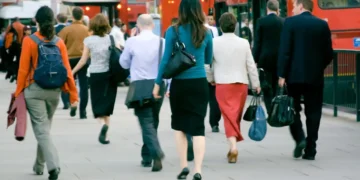- Young workers feel they are facing dwindling employment prospects as a result of the pandemic, according to new research.
- They feel they are missing out on skills, qualifications, and the opportunity to build networks that could further their career.
- Their wellbeing is also suffering, as job insecurity is a stressor that has been linked to anxiety, social dysfunction, and depression.
A recent survey conducted by the Health Foundation found that young workers feel their employment prospects are dwindling due to the COVID-19 pandemic, and, as a result, their wellbeing is suffering.
Martina Kane, policy and engagement manager at the Health Foundation, said that the current situation young workers find themselves in “has worrying implications for their long-term health.”
The research was conducted as part of the Health Foundation’s ‘Young people’s future health inquiry’, which is looking at ways to improve the long-term health of young people.
The survey found that 86% feel the pandemic has negatively impacted their opportunity to achieve the right skills and qualifications for their chosen career. Furthermore, 86% also feel that the pandemic impacted their ability to develop the right relationships and networking opportunities to help enter or progress in the working environment; connections that could have otherwise help them find a job in an already tough labor market.
The opportunities for young workers to gain the right skills and find secure work are narrowing, the Health Foundation concluded, arguing that “failure to take appropriate action now risks damaging young people’s long-term health as well as their economic prospects.”
Job insecurity has been linked to higher scores on health scales, including somatic symptoms, anxiety, social dysfunction, and depression. Job insecurity is a relevant stressor, and one that is deeply affecting young workers at the moment.
The Health Foundation found that “the majority of respondents (54%) said that most of the jobs they had seen recently that they were interested in were temporary or contract positions. 35% felt that it would be difficult to find secure work that is fairly paid and has scope for career growth and development in the next six months.”
As it currently stands, it appears that “fewer young people are being given the chance to succeed making it more likely that their long-term health will suffer as a result.” Especially considering that young people feel like there is now less support available than prior to the pandemic.
According to the survey, 80% of those surveyed agreed that the pandemic has made young people’s mental health worse.
The survey also highlighted the fact that there appears to be less support available for those experiencing mental health issues. 80% said the pandemic had a negative impact on the availability of emotional support and 69% agreed that it had become harder to access mental health support.
“The lack of emotional and mental health support that young people have highlighted in this survey is likely to be exacerbating the impact on their health. There is a strong relationship between work and mental health — particularly for young people who may be taking their first crucial steps into the job market,” Kane added.
Research from Advanced also found that young workers are struggling, even those that have stable employment. According to their findings, young workers with a stable job feel overworked and underappreciated.
Advanced found that only 37% of 18–24-year-olds say their manager has introduced regular check-ins since working remotely over the last 12 months. Plus, two-thirds of young workers said they have been expected to perform urgent tasks outside of working hours. One in five 18-24-year-olds say a lack of autonomy and trust from their manager is holding them back from being more productive at work.
The above suggests that “managers expect younger employees to put in extra unpaid hours, and that possibly a lack of experience, confidence, or job security makes it harder for them to refuse.”
Alex Arundale, Chief People Officer at Advanced, said that “the pandemic has had a negative impact on all age groups, but it’s 18–24-year-olds who have been hit the hardest.”
Work environment is also affecting young workers’ mental health, according to Advanced. “One in four say they have been stuck working in their bedroom while living at home or isolated in flat/house shares with strangers.”
Arundale argues that young workers that are struggling to put together the basics they need to work from home and create the right workplace environment “has made it incredibly difficult for them to separate work from personal life, which is clearly leading to feelings of isolation and cabin-fever.”
It’s no surprise, then, that young workers are the most eager to return to the office.
“44% of 18-24-year-olds are really looking forward to returning to the workplace – compared to 19% for over 25s – and 60% admit social interaction is the main reason for wanting to return to the office,” the research found.”



 Dr. Gleb Tsipursky – The Office Whisperer
Dr. Gleb Tsipursky – The Office Whisperer Nirit Cohen – WorkFutures
Nirit Cohen – WorkFutures Angela Howard – Culture Expert
Angela Howard – Culture Expert Drew Jones – Design & Innovation
Drew Jones – Design & Innovation Jonathan Price – CRE & Flex Expert
Jonathan Price – CRE & Flex Expert











